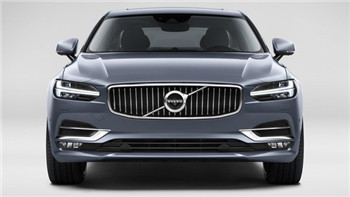
VolvoвҖҷs new S90 saloon has a familiar face. The car is the second big model to come off the Swedish brandвҖҷs heavily touted $11bn vehicle platform and follows the sleek, critically acclaimed XC90 sport utility vehicle.
жІғе°”жІғ(Volvo)е…Ёж–°S90иҪҝиҪҰжңүеүҜвҖңзҶҹи„ёеӯ”вҖқгҖӮиҝҷжҳҜиҜҘз‘һе…ёе…¬еҸёеӨҮеҸ—еҗ№жҚ§гҖҒиҖ—иө„110дәҝзҫҺе…ғжү“йҖ зҡ„иҪҰиҫҶз”ҹдә§е№іеҸ°дёӢзәҝзҡ„第дәҢж¬ҫеӨ§еһӢиҪҰпјҢиҖҢ第дёҖж¬ҫеҲҷжҳҜе№ҝеҸ—еҘҪиҜ„гҖҒеӨ–еҪўе…ёйӣ…зҡ„XC90иҝҗеҠЁеһӢеӨҡеҠҹиғҪиҪҰ(SUV)гҖӮ
The S90 has the same, T-shaped LED headlights вҖ” a nod to ThorвҖҷs hammer from Norse mythology вҖ” and a grille made of 23 rods of curved iron.
S90еҗҢж ·й…ҚеӨҮдәҶвҖңTвҖқеӯ—еһӢLEDеӨ§зҒҜвҖ”вҖ”еҸ–ж„ҸдәҺжҢӘеЁҒзҘһиҜқдёӯзҡ„вҖңйӣ·зҘһд№Ӣй”ӨвҖқпјҢе…¶ж јж …з”ұ23ж №е‘ҲзҺ°еј§еәҰзҡ„й’ўж Ҹз»„жҲҗгҖӮ
вҖңThis is the face of Volvo,вҖқ says chief designer Thomas Ingenlath. вҖңItвҖҷs confident, itвҖҷs proud and it is strong.вҖқ
вҖңиҝҷе°ұжҳҜжІғе°”жІғзҡ„еүҚи„ёпјҢвҖқйҰ–еёӯи®ҫи®ЎеёҲжүҳ马ж–ҜиӢұж јжӢүзү№(Thomas Ingenlath)з§°пјҢвҖңе®ғжҳҫеҫ—иҮӘдҝЎгҖҒйӘ„еӮІгҖҒзЎ¬жң—гҖӮвҖқ
To that list could be added the word independent.
иҝҷдёҖзі»еҲ—зҡ„дҝ®йҘ°иҜӯдёӯиҝҳеҸҜд»ҘеҠ е…ҘвҖңзӢ¬з«ӢвҖқдёҖиҜҚгҖӮ
Five years after falling under the control of Chinese industrial group Zhejiang Geely Holding in a landmark Asian acquisition, Volvo feels more Scandinavian вҖ” and more successful вҖ” than ever.
5е№ҙеүҚпјҢдёӯеӣҪжөҷжұҹеҗүеҲ©жҺ§иӮЎйӣҶеӣў(Zhejiang Geely Holding)е®ҢжҲҗдәҶдёҖжЎ©еңЁж•ҙдёӘдәҡжҙІе…·жңүж Үеҝ—жҖ§ж„Ҹд№үзҡ„收иҙӯжЎҲпјҢе°ҶжІғе°”жІғзәіе…ҘйәҫдёӢгҖӮеҰӮд»Ҡзҡ„жІғе°”жІғж„ҹи§үжҜ”д»ҘеҫҖжӣҙе…·еҢ—欧зү№иүІпјҢд№ҹжӣҙеҠ жҲҗеҠҹгҖӮ
The company is forecasting a large rise in profits and record sales this year. It is gaining credibility as an alternative to the three German premium carmakers. The privately held company is even preparing to tap the bond market for the first time.
иҜҘе…¬еҸёйў„и®Ўд»Ҡе№ҙеҲ©ж¶Ұе°ҶжңүеӨ§е№…жҸҗй«ҳпјҢ并е°ҶеҲӣдёӢй”ҖйҮҸзәӘеҪ•гҖӮе…¶дҪңдёәдёүеӨ§еҫ·зі»иұӘиҪҰе“ҒзүҢжӣҝд»Јд№ӢйҖүзҡ„еЈ°иӘүж—ҘзӣӣгҖӮиҝҷ家з§ҒдәәжҺ§иӮЎе…¬еҸёз”ҡиҮіеҮҶеӨҮйҰ–ж¬Ўиҝӣе…ҘеҖәеҲёеёӮеңәиһҚиө„гҖӮ
Now Volvo is trying to shake off its buttoned-up reputation and tell the world about its transformation.
еҰӮд»ҠпјҢжІғе°”жІғжӯЈиҜ•еӣҫж‘Ҷи„ұе…¶еҶ…ж•ӣеҗ«и“„зҡ„еҗҚеЈ°пјҢеҗ‘дё–з•Ңе®Је‘Ҡе®ғзҡ„иҪ¬еҸҳгҖӮ
вҖңWeвҖҷre a normal company,вҖқ says Hakan Samuelsson, VolvoвҖҷs understated chief executive, in an interview at the companyвҖҷs Gothenburg headquarters. The group still shares part of the site with the truckmaker of the same name that used to own Volvo.
вҖңжҲ‘们е°ұжҳҜдёҖ家жӯЈеёёзҡ„е…¬еҸёпјҢвҖқиЎҢдәӢдҪҺи°ғзҡ„жІғе°”жІғйҰ–еёӯжү§иЎҢе®ҳе“ҲеқҺиҗЁзјӘе°”жЈ®(Hakan Samuelsson)иЎЁзӨәгҖӮд»–еңЁе“Ҙеҫ·е ЎжІғе°”жІғжҖ»йғЁжҺҘеҸ—йҮҮи®ҝпјҢиҜҘе…¬еҸёд»Қ然дёҺжӣҫз»Ҹзҡ„дёң家вҖ”вҖ”еҗҢеҗҚзҡ„еҚЎиҪҰеҲ¶йҖ е•ҶпјҢе…ұз”ЁйғЁеҲҶеҠһе…¬ең°зӮ№гҖӮ
Mr SamuelssonвҖҷs predecessors had plenty of defending to do. Volvo, aS part of FordвҖҷs Premier Automotive Group between 1999 and 2010, suffered stagnating sales. It was not helped by uninspired products that were вҖ” Volvo executives now say вҖ” compromised by having to share parts, styles and skeletons with its US parent.
иҗЁзјӘе°”жЈ®зҡ„еүҚ任们еҒҡиҝҮеҫҲеӨҡиҮӘжҲ‘иҫ©жҠӨзҡ„дәӢгҖӮ1999е№ҙиҮі2010е№ҙжңҹй—ҙпјҢдҪңдёәзҰҸзү№(Ford)ж——дёӢPremier Automotive Group(PAG)зҡ„еӯҗе…¬еҸёпјҢжІғе°”жІғз»ҸеҺҶдәҶй”ҖйҮҸеҒңж»һдёҚеүҚзҡ„ж—¶жңҹгҖӮдәҶж— ж–°ж„Ҹзҡ„дә§е“ҒжӣҙжҳҜдәҺдәӢж— иЎҘгҖӮжІғе°”жІғй«ҳеұӮеҰӮд»Ҡз§°пјҢеҪ“ж—¶з”ҹдә§зҡ„иҪҰеһӢдёҚеҫ—дёҚдёҺе…¶зҫҺеӣҪжҜҚе…¬еҸёзҡ„е…¶д»–иҪҰеһӢе…ұз”Ёйӣ¶д»¶е’Ңж•ҙдҪ“жһ¶жһ„пјҢйЈҺж јеҰӮеҮәдёҖиҫҷгҖӮ
вҖңIf this was a hospital, the patient would have been declared dead,вҖқ says one Volvo manager of the then lossmaking company.
вҖңеҰӮжһңжңүжұҪиҪҰеҢ»йҷўзҡ„иҜқпјҢйӮЈд№ҲеҪ“ж—¶жІғе°”жІғиҝҷдёӘз—…дәәе°ұе·Із»Ҹиў«е®Јеёғжӯ»дәЎдәҶпјҢвҖқдёҖдҪҚз»ҸзҗҶи°ҲеҲ°еҪ“ж—¶дәҸжҚҹзҡ„жІғе°”жІғж—¶иҜҙйҒ“гҖӮ
Under Chinese ownership, Volvo is getting on to the shopping list of drivers who normally prefer Audi, BMW and Mercedes-Benz. The XC90 put Volvo into a higher price category and has had consumer magazines agog with its sleek interior, in-car technology and advanced safety features.
еңЁеҗүеҲ©жҺ§иӮЎдёӢзҡ„жІғе°”жІғйҖҗжёҗиҝӣе…ҘйҖҡеёёеҒҸзҲұеҘҘиҝӘ(Audi)гҖҒе®қ马(BMW)е’ҢеҘ”й©°(Mercedes-Benz)зҡ„иҪҰдё»зҡ„йҖүиҙӯжё…еҚ•гҖӮXC90жҸҗеҚҮдәҶжІғе°”жІғзҡ„дә§е“Ғд»·дҪҚпјҢж¶Ҳиҙ№иҖ…жқӮеҝ—еӨ§и°ҲиҜҘиҪҰеһӢж—¶е°ҡзҡ„еҶ…йҘ°гҖҒиҪҰиҪҪжҠҖжңҜе’Ңе…ҲжҖ§зҡ„е®үе…ЁжҖ§иғҪгҖӮ
вҖң[Geely] bought Volvo because they assumed Volvo deserved a better future,вҖқ says Mr Samuelsson. вҖңThey wanted to release the tiger. And they are seeing that happening now, in steps.вҖқ
вҖңпјҲеҗүеҲ©пјү收иҙӯжІғе°”жІғпјҢжҳҜеӣ дёә他们и®ӨдёәжІғе°”жІғеҖјеҫ—жӢҘжңүжӣҙеҘҪзҡ„жңӘжқҘпјҢвҖқиҗЁзјӘе°”жЈ®з§°пјҢвҖң他们жғіж”ҫеҮәиҝҷеҸӘзҢӣиҷҺгҖӮзҺ°еңЁпјҢ他们жӯЈеңЁйҖҗжӯҘзңӢеҲ°иҝҷдёҖеҲҮжҲҗдёәзҺ°е®һгҖӮвҖқ
The companyвҖҷs ambition draws comparisons with another resurgent premium carmaker вҖ” Jaguar Land Rover of the UK вҖ” which was also formerly part of the Ford stable and has since fallen into Asian possession.
жІғе°”жІғзҡ„йӣ„еҝғеҸҜдёҺеҸҰдёҖдёӘдёңеұұеҶҚиө·зҡ„иұӘиҪҰе“ҒзүҢвҖ”вҖ”иӢұеӣҪзҡ„жҚ·иұ№и·ҜиҷҺ(Jaguar Land Rover)дҪңжҜ”гҖӮжҚ·иұ№и·ҜиҷҺд»ҘеүҚд№ҹжҳҜзҰҸзү№ж——дёӢзҡ„е“ҒзүҢпјҢеҗҺжқҘиў«дәҡжҙІдјҒдёҡ收иҙӯгҖӮ
So far, JLRвҖҷs profitability has left Volvo in the dust. The British-based group made 2.6bn in pre-tax profit in its last financial year вҖ” twice what Tata Motors paid Ford to acquire the two UK brands in 2008.
зӣ®еүҚдёәжӯўпјҢжҚ·иұ№и·ҜиҷҺзҡ„зӣҲеҲ©иғҪеҠӣд»ӨжІғе°”жІғжңӣе°ҳиҺ«еҸҠгҖӮдёҠдёҖиҙўе№ҙпјҢиҝҷ家жҖ»йғЁеңЁиӢұеӣҪзҡ„йӣҶеӣўе®һзҺ°дәҶ26дәҝиӢұй•‘зЁҺеүҚеҲ©ж¶ҰвҖ”вҖ”жҜ”2008е№ҙеЎ”еЎ”жұҪиҪҰ(Tata Motors)д»ҺзҰҸзү№жүӢдёӯ收иҙӯиҝҷдёӨдёӘиӢұеӣҪе“ҒзүҢж—¶ж”Ҝд»ҳзҡ„д»Јд»·й«ҳеҮәдёҖеҖҚгҖӮ
Volvo made only $260m in operating profits last year, despite selling an almost identical number of cars вҖ” about 460,000.
еҺ»е№ҙпјҢе°Ҫз®ЎжІғе°”жІғеҚ–еҮәдәҶеҮ д№ҺдёҺжҚ·иұ№и·ҜиҷҺзӣёеҗҢж•°йҮҸзҡ„жұҪиҪҰвҖ”вҖ”зәҰ46дёҮиҫҶпјҢдҪҶе…¶иҗҘдёҡеҲ©ж¶Ұд»…дёә2.6дәҝзҫҺе…ғгҖӮ
Operating margins at Volvo are also thin вҖ” 2.2 per cent in the first half of this year. JLR, by contrast, makes operating margins close to 10 per cent, having built on the success of products conceived during the Ford era, such as the Range Rover Evoque.
жІғе°”жІғзҡ„иҗҘдёҡеҲ©ж¶ҰзҺҮд№ҹеҫҲдҪҺвҖ”вҖ”д»Ҡе№ҙдёҠеҚҠе№ҙдёә2.2%гҖӮзӣёжҜ”д№ӢдёӢпјҢжҚ·иұ№и·ҜиҷҺзҡ„иҗҘдёҡеҲ©ж¶ҰзҺҮжҺҘиҝ‘10%пјҢиҝҷе»әз«ӢеңЁжңӘ被收иҙӯеүҚжһ„жғізҡ„еӨҡж¬ҫиҪҰеһӢвҖ”вҖ”еҰӮи·ҜиҷҺжҸҪиғңжһҒе…ү(Range Rover Evoque)вҖ”вҖ”еӨ§иҺ·жҲҗеҠҹзҡ„еҹәзЎҖдёҠгҖӮ
At Volvo, вҖңwe based our turnround exactly on a new platform, new vehicles, not just new-style vehicles,вҖқ says Mr Samuelsson. вҖңI donвҖҷt think you can say that Jaguar has that same process. So that, of course, takes a longer time.вҖқ
еңЁжІғе°”жІғпјҢвҖңжҲ‘们зҡ„еӨҚе…ҙе®Ңе…ЁеҹәдәҺж–°е№іеҸ°гҖҒж–°иҪҰеһӢпјҢиҖҢдёҚд»…д»…жҳҜеҗҢиҪҰеһӢзҡ„ж–°ж¬ҫпјҢвҖқиҗЁзјӘе°”жЈ®з§°пјҢвҖңжҲ‘жғідҪ дёҚиғҪиҜҙи·ҜиҷҺд№ҹз»ҸеҺҶдәҶдёҖж ·зҡ„иҝҮзЁӢгҖӮжүҖд»ҘпјҢиҝҷеҪ“然дјҡеҜјиҮҙжҲ‘们йңҖиҰҒжӣҙеӨҡж—¶й—ҙгҖӮвҖқ
Volvo created Spa (scaleable product architecture), the first of two completely new modular building systems, for large cars. It has moved to innovative, four-cylinder petrol and diesel engines that will power the majority of its future cars. And by 2019, it will have a line-up of nine new or reworked vehicles: three sizes in three different styles.
жІғе°”жІғе»әи®ҫдәҶеҲ¶йҖ еӨ§еһӢиҪҰзҡ„SPAе№іеҸ°(scaleable product architectureпјҢеҸҜжү©еұ•иҪҰдҪ“жһ¶жһ„)пјҢиҝҷжҳҜдёӨдёӘе…Ёж–°зҡ„жЁЎеқ—еҢ–з”ҹдә§дҪ“зі»дёӯзҡ„第дёҖдёӘгҖӮиҜҘе…¬еҸёе·ІејҖе§ӢйҮҮз”ЁеҲӣж–°жҖ§зҡ„гҖҒеӣӣзјёжұҪжІ№жҲ–жҹҙжІ№еҸ‘еҠЁжңәпјҢжңӘжқҘе…¶еӨ§еӨҡж•°иҪҰеһӢе°Ҷдҫқйқ иҝҷзұ»еј•ж“ҺжҸҗдҫӣеҠЁеҠӣгҖӮеҲ°2019е№ҙпјҢе®ғе°ҶжӢҘжңү9ж¬ҫе…Ёж–°жҲ–ж”№иҝӣзүҲиҪҰеһӢзҡ„дә§е“Ғйҳөе®№пјҢеңЁ3з§ҚдёҚеҗҢйЈҺж јзҡ„иҪҰеһӢдёӯеҲҶеҲ«жңү3з§ҚдёҚеҗҢзҡ„и§„ж јгҖӮ
Volvo is now moving into phase two of its turnround: capitalising on the investments, launching the new products, and sustaining a higher price point.
жІғе°”жІғеҰӮд»ҠжӯЈжӯҘе…Ҙе…¶еӨҚе…ҙи®ЎеҲ’зҡ„第дәҢйҳ¶ж®өпјҡеҲ©з”ЁжҠ•иө„гҖҒжҺЁеҮәж–°дә§е“ҒгҖҒз»ҙжҢҒиҫғй«ҳд»·дҪҚгҖӮ
Attention now turns to the second, smaller toolkit: CMA, which stands for compact modular architecture and is the big test of VolvoвҖҷs relationship with its Chinese paymasters.
зҺ°еңЁжҠҠзӣ®е…үиҪ¬еҗ‘第дәҢдёӘиҫғе°Ҹзҡ„з”ҹдә§е№іеҸ°пјҡзҙ§еҮ‘еһӢжЁЎеқ—еҢ–жһ¶жһ„CMAпјҢе®ғе°Ҷз»ҷжІғе°”жІғдёҺе…¶дёӯеӣҪдёң家зҡ„е…ізі»еёҰжқҘйҮҚеӨ§иҖғйӘҢгҖӮ
Geely Auto, the Hangzhou-based volume carmaker also owned by VolvoвҖҷs parent, is working with Volvo to create midsize cars in a variety of shapes вҖ” hatchbacks, sedans and small SUVs. The platform is an attempt to find cost savings and make acceptable margins on small cars.
жҖ»йғЁдҪҚдәҺжқӯе·һзҡ„еҗүеҲ©жұҪиҪҰ(Geely Auto)д№ҹжҳҜжІғе°”жІғжҜҚе…¬еҸёж——дёӢзҡ„е…¬еҸёгҖӮеҗүеҲ©жұҪиҪҰжӯЈеңЁдёҺжІғе°”жІғе…ұеҗҢз ”еҸ‘еҗ„з§ҚиҪҰеһӢвҖ”вҖ”жҺҖиғҢиҪҰгҖҒиҪҝиҪҰе’Ңе°ҸеһӢSUVвҖ”вҖ”зҡ„дёӯзә§иҪҰгҖӮCMAе№іеҸ°жҳҜеңЁе°ҸеһӢиҪҰйўҶеҹҹеҜ»жүҫжҲҗжң¬иҠӮзңҒз©әй—ҙгҖҒеҲӣйҖ еҗҲж„Ҹзҡ„еҲ©ж¶ҰзҺҮзҡ„дёҖж¬Ўе°қиҜ•гҖӮ
It means upmarket Volvo must share parts with firmly mass-market Geely. That task has scuppered a high-profile former alliance with the DaimlerChrysler. вҖңItвҖҷs very difficult to develop platforms and architectures if the brands are positioned very differently,вҖқ says Martin , associate professor at Stockholm School of Economics.
иҝҷж„Ҹе‘ізқҖпјҢй«ҳз«Ҝе“ҒзүҢжІғе°”жІғеҝ…йЎ»дёҺеқҡе®ҡең°иө°еӨ§дј—еёӮеңәи·Ҝзәҝзҡ„еҗүеҲ©е…ұдә«йӣ¶д»¶гҖӮиҝҷж ·зҡ„д»»еҠЎз ҙеқҸдәҶжӯӨеүҚжІғе°”жІғдёҺжҲҙе§ҶеӢ’е…ӢиҺұж–ҜеӢ’(DaimlerChrysler)д№Ӣй—ҙеӨҮеҸ—зһ©зӣ®зҡ„еҗҲдҪңгҖӮвҖңеҰӮжһңдёҚеҗҢе“ҒзүҢзҡ„е®ҡдҪҚжҲӘ然дёҚеҗҢпјҢеҫҲйҡҫе…ұеҗҢз ”еҸ‘е№іеҸ°е’Ңжһ¶жһ„пјҢвҖқж–Ҝеҫ·е“Ҙе°”ж‘©з»ҸжөҺеӯҰйҷў(Stockholm School of Economics)зҡ„еүҜж•ҷжҺҲ马дёҒж–Ҝ科尔(Martin )гҖӮ
But the collaboration вҖ” enshrined in China Euro Vehicle Technology, a sister company to Volvo and Geely Auto вҖ” gives Volvo greater volumes for its engines. Geely in return gets European design and perhaps the chance to become the first Chinese carmaker to achieve global renown.
дҪҶжҳҜпјҢиҝҷж¬ЎеҗҲдҪңвҖ”вҖ”еҸҢж–№жҲҗз«ӢдәҶеҗүеҲ©жұҪиҪҰ欧жҙІз ”еҸ‘дёӯеҝғпјҲChina Euro Vehicle TechnologyпјҢз®Җз§°CEVTпјүвҖ”вҖ”дҪҝжІғе°”жІғеҸҜд»Ҙз”ҹдә§жӣҙеӨҡеҸ‘еҠЁжңәгҖӮеҗүеҲ©еҫ—еҲ°зҡ„еӣһжҠҘжҳҜ欧жҙІзҡ„и®ҫи®ЎпјҢжҲ–и®ёиҝҳжңүжңәдјҡжҲҗдёә第дёҖ家дә«иӘүеӣҪйҷ…зҡ„дёӯеӣҪжұҪиҪҰеҲ¶йҖ е•ҶгҖӮ
There is still some talk around Gothenburg and among suppliers of conflict between the Chinese and Swedish participants in and around CEVT.
еңЁе“Ҙеҫ·е ЎдёҖеёҰд»ҘеҸҠдҫӣиҙ§е•Ҷдёӯй—ҙпјҢд»Қ然жөҒдј зқҖCEVTзҡ„дёӯж–№е’Ңз‘һж–№дәәе‘ҳеӯҳеңЁж‘©ж“Ұзҡ„иҜҙжі•гҖӮ
вҖңOf course it has been challenging вҖ” God, I can tell you, there are days I wonder, вҖҳHow the hell should we fix this?вҖҷ,вҖқ says Mats Fagerhag, the former R&D chief at Saab who runs CEVT.
вҖңиҝҷеҪ“然еҫҲжңүжҢ‘жҲҳжҖ§вҖ”вҖ”еӨ©е•ҠпјҢжҲ‘еҸҜд»Ҙе‘ҠиҜүдҪ пјҢжңүж—¶жҲ‘дјҡжғіпјҢвҖҳжҲ‘们еҲ°еә•иҜҘжҖҺд№Ҳи§ЈеҶіпјҹвҖҷвҖқCEVTзҡ„иҙҹиҙЈдәәж–№жө©зҖҡ(Mats Fagerhag)з§°гҖӮд»–жӣҫдё»з®ЎиҗЁеҚҡ(Saab)з ”еҸ‘йғЁй—ЁгҖӮ
But he says the focused nature of the collaboration means Volvo and Geely have created a вҖңsmarterвҖқ way of integrating. вҖңSomehow you are forced: letвҖҷs solve those cultural issues here quickly here because we have an important task to do.вҖқ
дҪҶжҳҜд»–з§°пјҢжӯӨж¬ЎеҗҲдҪңзӣ®ж ҮжҳҺзЎ®пјҢж„Ҹе‘ізқҖжІғе°”жІғе’ҢеҗүеҲ©еҲӣйҖ дәҶдёҖз§ҚвҖңиҫғиҒӘжҳҺзҡ„вҖқиһҚеҗҲж–№ејҸгҖӮвҖңжҹҗз§ҚзЁӢеәҰдёҠдҪ жҳҜиў«йҖјзҡ„пјҡи®©жҲ‘们иҝ…йҖҹи§ЈеҶіиҝҷдәӣж–ҮеҢ–й—®йўҳпјҢеӣ дёәжҲ‘们иҝҳжңүйҮҚиҰҒзҡ„д»»еҠЎиҰҒеҺ»е®ҢжҲҗгҖӮвҖқ












